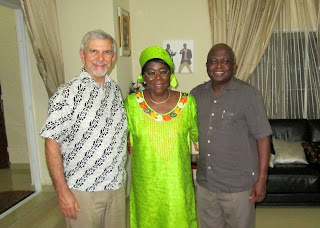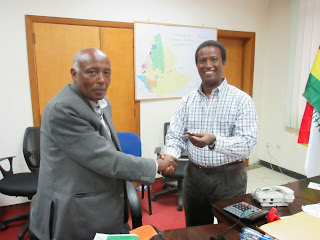It’s not on the way to anywhere!
 |
| Main Bissau waterfront road |
Guinea-Bissau is a tiny, forgotten West African country
stuck between Senegal and Guinea-Conakry. Not only is it isolated
geographically, due to huge rivers and an island archipelago, but its Portuguese
national language further separates it from all of its French-speaking
neighbors. It’s no wonder that the sense of being forgotten, bypassed, and
marginalized seems to be written all over the faces of its citizens.
 |
| Sunday morning church service |
Yet, I have found the past four days here in Guniea-Bissau some of the
most fulfilling of my recent travels. I was invited on this trip by Miguel
Indibe, the director of ITA, the Institute of Translation and Literacy. Thanks
to an introduction bu Bruce Smith, CEO of Wycliffe Associates, I met Miguel two
years ago and ever since have been mentoring him in his leadership role. But
this was my first chance to visit his country.
Despite being a tiny country with a population of less than
two million, it is not short on tribal languages which number about thirty. But
of those, only one has a complete Bible and three have New Testaments. However,
all Bible resources are super dated making them especially irrelevant to the
youth. And the couple of translation projects that are underway are all taking
way longer than expected thanks to being at the bottom of everyone’s priority
list for completion.
 |
| Sharing Wycliffe Associate tablet translation resources |
So what has made this trip so fulfilling? First, it was the
pleasure of speaking to the 1,200 who were packed into a Sunday morning service
all sharing the “joy of the Lord” in typical African fashion. Second, it was
seeing the excitement and renewed hope in the eyes of the Bible translation
staff as I shared new resources Wycliffe Associates has available for them that
could significantly speed up their translation efforts. Third, it was being
invited to address a number of national church leaders and helping them learn
how to connect with the continental African mission’s movement. The VP of one
church group said to me, “No one from Guinea-Bissau has ever participated in a
major African or global consultation because we always learn about them after
the fact. Finally, you are here telling us of two opportunities to attend
African conferences next year. You can bet this time we’ll be represented.”
Guinea-Bissau may be small and forgotten, but it has a higher percentage of Christians than any of its neighbors. And, from what I can see, they’re ready to be mobilized. It is a privilege for me to play a tiny role in helping to make that happen.
 |
| Guinea-Bissua church leaders glad to be encouraged |































